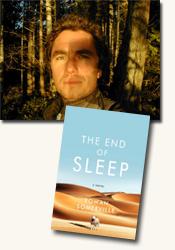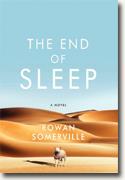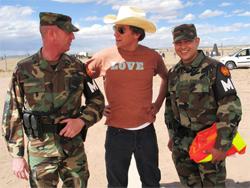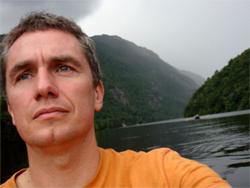author interview
book reviews:
· general fiction
· chick lit/romance
· sci-fi/fantasy
· graphic novels
· nonfiction
· audio books
· author interviews
· children's books @
curledupkids.com
· DVD reviews @
curledupdvd.com
newsletter
win books
buy online
links
home
for authors
& publishiss
for reviewers
The maga Portunista and her colorful subcommanders lead a ragged, outnumbered brigade in the wake of an international war, against her increasingly ruthless adversaries. But the ambitious commander finds herself irreconcilably drawn to a charismatic, kind and hopeful stranger. Click his e for more on Cry of Justice or read our review.
|
|||||
 
Michael Leonard interviewed Irish author Rowan Somerville about
his debut novel, the attraction of Cairo, the loneliness and frustration of writing, and the fortune teller who set him on the journey to The End of Sleep Interviewer Michael Leonard: What was your inspiration for writing The End of Sleep Rowan Somerville: I began writing the novel after a night of profound carousing with a marvelous Welsh writer and musician and nightclub impresario called Chris Sullivan .We were discussing life and culture and other fun stuff and at about four am he said “why don’t you stop talking about other writers and write something yourself.” I began the next day. When we first meet Fin he has a hangover and is accused of being “louche” and drunken. His attitude almost sets us up for much of what is to come. What do you think this tells us about Fin’s character? I don’t think Fin is really louche –in the sense of being disreputable or of dubious moral character. The Newspaper Editor is only sacking him because the US embassy must have complained and it might be bad for business. Fin has though been trying to anaesthetize his frustrations in life through alcohol. This certainly tells us he ain’t happy. Fin’s thinks his article on kebab shops on the King Faisal Road was nothing special - just a document of his frustration. In the light of this, what kind of compromises do you think Fin has made regarding his career? Fin is hard on himself . His life is a document of frustration . He’s been waiting all his life for some sort of epiphany –a moment (like Saul on the road to Damascus) when everything will be revealed, he’s waiting for the thing, be it love, career or the divine which will make everything all right. Even in Fin’s personal life he remains a bit of an anathema, never marrying and, although he’s slept with a lot of women, he remains rather absent from life. Why do you think Fin is so emotionally shut down? Upbringing, religion Hollywood myths, booze… From the outset you embed Fin firmly within time and place, with the minarets of Cairo calling out and resting in the ruins and cracks of other religions. Why do you think Fin - and by association other Westerners - are so overwhelmed, attracted, and sometimes even repelled by this world? It’s such a big question that I just cant do it justice here but let me suggest that the time frame is so different, more fluid. Time is marked by the prayer calls –these change every single day according to the position of the sun. The narratives are not linear, they don’t end with the happy ever after, they move up and down like the sun. I don’t imply an objective otherness here – I mean I am like that too, it’s one of the things that attracts me.
I am putting a bit of fun in fundamentalism here. Perhaps this is inappropriate when one considers that fundamentalism - be it Christian, Moslem, or Marxist – represents such a threat to contentment, wisdom and health in the world. Farouk is certain about everything he believes in and if he is proved wrong he changes opinion and completely believes in the new idea. He brokers no argument, his word is absolute – all this can be a real pain in the ass. However, he also has a great deal of wisdom and much love for Fin so this is worth hanging around for. Fin is somewhat seduced by the effects of Arab hospitality when he and Farouk visit the house of Old Sheikh. His appreciation of the more mystical aspects of the Arab world expands through the events that take place here. How do you think this experience prepares Fin for what he will face throughout the rest of the story? Like Farouk’s tale, the sacrificed rabbit and so much more, The Old Sheik’s ceremony may be authentic - an experience of profound understanding – or it may be hocus pocus. To me – they are all relevant and important – Fin is turned back on himself – that’s where the treasure is. Through his experiences with Farouk, Fin sees another side of life. How do you think this influences his feelings about the city of Cairo and of Arab culture in general? Fin’s experiences with Farouk and Arab culture help him to find something valuable in life. Fin wants to know why the Old Sheik is special; “What has he done?” he asks. Farouk grabs a child and tells him that all the old are special, like the fact that all children are special. Sorry not to be clear here, I could go on and on… Why do you thin Fin is so anxious to get the heart of Skinhead Said’s story? Why do you think he gets so frustrated with Farouk’s desire to reveal the story’s details so randomly? It’s all down to our hunger for ‘pacey linear narratives’ – Fin wants a happy-ever-after, he wants fulfillment in a happy ending, he like us, is misled by the myths of our society. Farouk maddens Fin with his unfinished stories, his sullen grunts and his petulant misery. In this light of this, what do you think Fin wants from Farouk (besides a good story, of course)? The meaning of life. What was your inspiration for the insane Omar? Where does his casual attitude towards violence come from? It would be wrong for me to say because he was inspired by an actual child and I want to make sure he is never revealed. How does the fate of being thrown into the Nile effect Fin’s decision to try and save Farouk? What does this say about a powerful man like Omar and his violent decision to seek revenge on Farouk? The Nile experience is a plunge, a baptism into the unconscious for Fin. After he finds absolution in the mosque. It is a critical point in his quest, he moves from active to passive, he shows courage (real courage is being terrified and then acting ). Omar is an incensed father –his daughter has been smashed up – he will find justice. How does this event begin to change the dynamic between Fin and his friend? Farouk owes him his life and he now must give him whatever Fin asks – but all he wants is this stupid tale…Farouk points him what he really wants…wisdom? When Fin is dumped into the Nile, his clothes are suffused in a river slime of decomposed rubbish and polluted mud. Is this symbolic for Fin’s own directionless life? Got it in one, my brother. Explain this idea that “Allah is in all places” and that “every corner of space and time is filled with prayer.” We are often evilly misled about Islam in the West . I am no Moslem but there is a real beauty to the Idea of God and the strivings of the spiritual permeating through the air five times a day.
I was there for thousands of hours in cafes and streets with my little notebook writing what I saw and felt. It was inspiring. The Pyramids have almost a spiritual connection to those who live on the outskirts of them. Tell us a bit about Mena village and its valuable horses along with the tunnels and tombs that seem to be always filled with ancient secrets. It’s a fascinating bizarre village. When Herodotus went there, it was already thousands of years old. Only a fraction of the ruins have been excavated. The craziness is about to change as the government have put up a huge fence separating the ancient sights from the village. We’ll have to see what happens. Dreams and the effects of them are a powerful force that reverberates throughout this novel. In fact, the whole narrative reads like a frenzied type of psychedelic dreamscape. Keeping this in mind, what are you trying to tell us about the importance of dreams? I have written down all my dreams for years. What they tell me about my life is like the advice of a part of myself I have no other access to. Cairo, on the surface is a city of filth, chaos and ruins, but also a place that is quite ebullient and teams with life, both in its beauty and in its ugliness. What initially attracted you to set your story in a place such as this? Here is the way it all started – you can here me say it on YouTube (search me by name)–I filmed myself in the garden in Donegal one day. One Christmas a dear friend gave me the mildly eccentric present of half a trip to see a fortune teller. Half a trip because this particular urban seer was expensive and my friend was, like me, sufficiently committed to the arts, so as not to be able to afford the whole price. But half a trip? What use is half a trip of anything? Put simply, I had little interest in seeing a fortune teller and less in one that I would have to pay for. So it had taken me three months to book an appointment and then only because my friend, although small in stature, has a fearsome temper.
I see Colin Farrell playing Fin, but if the book were ever optioned for a film, do you have anyone in mind who you think would be good in the lead role? I suppose it would be good having him because the movie would get made and I would get some cash –but I truth I’d rather someone like Rhys Iffans . What did you find the most challenging in writing The End of Sleep I find it very difficult to write. I thought maybe I was a sham as a writer because I find it so lonely, so frustrating, in some ways I don’t even like it. And yet I also love it and hope to do it for the rest of my life.
Finally, are you working on a new novel? If so, would you like to share with us a little bit about it? I am 47,349 words through the next one – its working title is Sex That Lasts For Years – it’s about sex and love and the courage to be imperfect.
Rowan Somerville has worked in television, film, and radio, and has also pursued his fortunes in Egypt. He lives in rural Ireland. This is his first novel. Michael Leonard is a contributing editor of curledup.com. His interview with Rowan Somerville was written in conjunction with his review of The End of Sleep. © Michael Leonard/2008.
|
|||||
| fiction · sf/f · comic books · nonfiction · audio newsletter · free book contest · buy books online review index · links · · authors & publishiss reviewers |
|
| site by ELBO Computing Resources, Inc. | |



